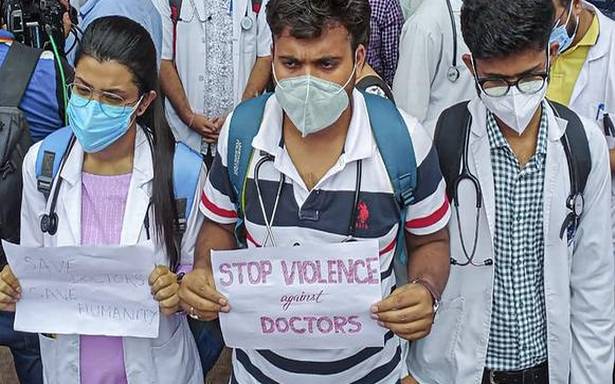The mental wellbeing of medicos during the pandemic needs attention and understanding too
“As physicians we owe our patients two things — only two things — our time and our skill. We do not owe our patients our lives.” – Dr Joseph D Wassersug (private practitioner in Internal Medicine from Massachusetts)
Clinical psychologist Diksha Gupta from Delhi mentions a resident doctor who has not left his room for a month and who barely slept, dreading that he may not wake up again. Doctors and healthcare workers across the country have been on their toes dealing with the daily influx of COVID-19 patients for more than a year now. Naturally the relentless struggle against the pandemic has led to physical and mental burnout among medical professionals.
Dr Rebecca Hendrickson of the University of Washington has outlined three factors responsible for this psychological stress — volume and intensity of their COVID-19-related work, level of fear about their safety, and the extent of demoralisation.
Long shifts ranging from six to 12 hours, and extending up to 48 hours in case somebody is absent, take a toll. In addition to this, the discomfort of being strapped in PPE kits for hours and separation from family and friends for months can actually desensitise healthcare workers so deeply that often they fail to react to the deaths in the COVID-19 wards. “It has become a routine to watch patients succumb to the Coronavirus infection that I can’t even recall what it was like when my first patient died,” says Dr Davinder Koli, senior resident at Delhi’s LNJP Hospital.
Another senior resident from the same hospital, Dr Kush Sharma, says being inadequately armed in terms of medicines, oxygen and other resources, also adds to their anxiety. “Imagine the anguish of watching patients who are confident of sailing through, collapsing suddenly… One minute they are eating and the next moment they are gone with their breakfast plate still in hand,” he says, and adds, “Patient after patient dies and you keep shifting from bed to bed hoping to save the next one.”
Most doctors also grapple with personal fear — of getting infected or infecting their families. They are also aware that if they or their relatives may need to get admitted, they might not get a bed in their own hospital, where they have been working so dedicatedly. Paediatric surgeon at LNJP, Dr Raghav Narang recalls how scared he was when his pregnant wife intubated a positive patient by mistake.
Doctors who were not trained to see so many sick patients earlier, have had to reorient themselves in critical care, constantly triage the patients and prioritise treatment to those who respond better, points out Dr Nikhil Gotmare, ophthalmologist at Guru Nanak Eye Centre, Delhi.
Psychiatrists helping out their brethren
Doctors are silently absorbing the gloom like a sponge, tired of being lionised or accused, choosing who gets a chance to live, facing grieving relatives, many of who have lost their breadwinners besides shouldering many other responsibilities simultaneously.
The implications of being at the forefront of such an unprecedented health crisis are expected to manifest later as a psychological pandemic in medicos. Many psychiatrists have hinted that doctors on COVID duty are suffering from Post Traumatic Stress Disorder (PTSD) or other conditions like depression, somatisation (symptoms include headache, giddiness, weakness, abdominal pain or bowel problems, incontinence, diarrhoea and constipation), obsessive-compulsive symptoms, anxiety, and severely altered sleep patterns.
Psychologists and psychiatrists have come forward to extend help to doctors dealing with the trauma. Dr Mahima Malhotra, Associate Professor at GIPMER, has started a helpline for medical staff who can call to share stressful personal or professional experiences. “We talk to them and suggest simple solutions such as yoga, writing a diary, or devoting at least 30 minutes to what they like doing,” she says. “Usually doctors hesitate to talk to psychiatrists and don’t even believe that they need one,” she says — patients may be afraid of being treated by doctors who have been diagnosed with poor mental health. “But this pandemic has made quite a few resident doctors turn to them,” she adds.
Gupta is offering online psychotherapy sessions under the Mental Health Initiative of Maulana Azad Medical Colllege. The hour-long sessions are attended, in turns, by residents of one particular department, and are aimed at identifying stress triggers and how to mitigate them. “We help people first understand the root cause and then feel confident about improving their situation. This promotes healthy behaviour and relationships and aids in expressing emotions better,” she says.
Institutional leadership apart, Dr Gotmare says doctors also need personalised resilience plans like a session of aerobic exercises before they begin their shift. Staying updated about the management protocols during duty hours helped him manage his stress levels, he says.
To keep anxiety at bay, Dr Koli goes through travel vlogs. “It reminds me of all those beautiful places I wish to visit with my family,” he says. For Dr Sharma, having a partner who is also a doctor, and understanding of the situation they both are in, makes for conversations that boost each other. Dr Narang watches films and calls up family and friends whenever he finds time. Everybody is trying to find their own coping mechanism.
Gupta says one should work on maintaining an intricate balance between external stress and one’s ability to cope with it. “When the balance is skewed, consciously choose one of the four As — avoid, alter, accept or adapt,” she adds.
Kinshuk Gupta is a third-year medical student based in Delhi.


